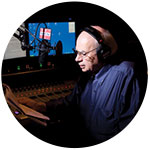By John Lienhard

Today, we tell the story of an illness.
Two recent books signal a shifting view of medicine. In 1993, Anne Hawkins wrote Reconstructing Illness. She invents the word pathography — the patient's story of his illness. In 1995, Arthur Frank wrote The Wounded Storyteller. Frank talks about the narrative power that the wound gives the storyteller. Both stress how important it is for the wounded person to tell about the wound.
"Stories," says Frank, "repair the damage that illness has done to the ill person's sense of where she is in life and where she is going." He tells of a woman, long since declared medically recovered from a cerebral aneurysm. Her body still suffered muscular asymmetries. She was still afflicted with occasional double vision. The word "cured" meant medicine had done all it knew how to do.
The woman referred to her stroke as her ethnicity — an outwardly minor, but inwardly essential, part of her being. Only in telling the story of her illness, could she finally take her recovery beyond the point at which medicine declared its job done.
We all undergo recoveries. In the process, we're repeatedly called on to tell the story of our illness. We usually answer in the technical language of medicine, distancing ourselves from our own bodies. We also recognize an unspoken obligation to be on the road to wellness.
"The jaw was broken and four teeth knocked out. It took years of reconstructive surgery," says an accident victim. Not, "My jaw!" and never mind that her face will never be the same. Our ethnicity does change after illness. Our road in life really is redirected.
It takes another language, a subjective tongue, to reveal the wound in terms medicine cannot address. If the storyteller chooses, or dares, to engage that voice, then the illness emerges as the transforming experience it really is.
The doctor's "case report and [the patient's] pathography," Hawkins tells us, "are mirrors set at an oblique angle to experience: each distorts, each tells the truth."
That idea first hit me when I read the diary of 18th-century author Fanny Burney. In 1811 she suffered one of the first mastectomies, long before the use of anesthetics. A year later she finally gave voice to her soul-searing story — but then only in her diary and only once. The entry is followed by the surgeon's much briefer account. Taken together they give us a chapter in the history of fighting cancer that we'd otherwise never have.
If I were a doctor, I'm sure I too would need distance. I too would try to separate the illness from the patient. I too would limit my arena of combat with illness. But these new books remind us that mind and body are one. Both the recovery from illness, and any full understanding of illness, have a huge dimension which modern medicine is still struggling to see clearly.
I'm John Lienhard, at the University of Houston, where we're interested in the way inventive minds work.

The Engines of Our Ingenuity is a nationally recognized radio program authored and voiced by John Lienhard, professor emeritus of mechanical engineering and history at the University of Houston and a member of the National Academy of Engineering. The program first aired in 1988, and since then more than 2,800 episodes have been broadcast. For more information about the program, visit engines.egr.uh.edu.